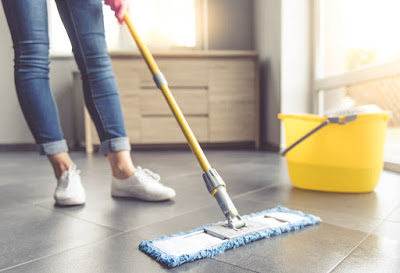1. Keep Your Floors Clean.
One of the easiest ways to keep pollutants out of the air in your home is to clean your floors regularly. Chemicals and allergens easily settle and accumulate on the floors of your home. From carpet to tile or wood flooring, you want to keep them all clean. By vacuuming often, you reduce concentrations of lead, brominated fire-retardant chemicals (PBDEs), pollen, pet dander, and dust mites. Mopping the floors picks up the dust that's left after vacuuming. To keep your floors from getting too dirty in the first place, be sure to put a doormat down for people to wipe their shoes on. You can even ask people to take their shoes off at the door to cut down on the pollutants brought into your home.
2. Assess the Chemical Use in Your Home.
Consistently using chemicals inside your home is not good for your health. While keeping your home clean is essential to improving your indoor air quality, how you complete that cleaning is also important. When possible, try to use all natural cleaning solutions such as vinegar and lemon. Industrial cleaners leave a residue that affects your air quality. Many household products, cleaning and otherwise, contain volatile organic compounds. You can reduce your exposure to VOCs by: purchasing natural cleaning products and air fresheners, avoiding aerosol sprays, purchasing fragrance-free or all-natural soaps and detergents, using soy or beeswax candles instead of petroleum-based wax, and using houseplants known to filter the air.
3. Improve Your Ventilation Systems.
Poor ventilation in your home can directly impact indoor air quality. Air flow is crucial for good indoor air quality. You can easily improve the airflow in your home by: opening a window, operating attic & ceiling fans, hiring a professional to clean and inspect the ducts in your home, and running exhaust fans when you cook, clean or bathe. Airtight homes, while "energy-efficient," tend to have poor indoor air quality because the pollutants can't escape, and fresh air isn't introduced.
Dust mites and mold, both contributors to poor air quality, love moisture. Controlling the humidity levels in your home is another way to improve your indoor air quality. Keeping the humidity level inside your home around 30-50% will help keep these, and other allergens, under control. Using a dehumidifier is one of the best ways to monitor and control the humidity levels inside your home. Learn more about this in our blog titled, "Benefits of Using a Dehumidifier in Your Home."
5. Keep Your AC Clean.
Keeping your HVAC unit clean is another great way to improve your indoor air quality, and you're giving your system a longer life in the process. Changing the air filter on your HVAC system monthly is one of the easiest things you can do to keep your system clean and running efficiently. The purpose of an air filter is to keep pollutants out of your air. It needs to be clean in order to do it's job. It's important to keep the rest of your system clean as well. Be sure to check the coils and drip pan regularly too.
Many of these steps are things you can accomplish on your own, but when it comes to a properly working HVAC system, you know who to call. Our Lake of the Ozarks HVAC company is here for all your heating and cooling needs. We want to help you with improving your indoor air quality by ensuring your system is in tip-top shape. For any HVAC maintenance needs at the Lake of the Ozarks, give us a call at 573-480-4313.
Many of these steps are things you can accomplish on your own, but when it comes to a properly working HVAC system, you know who to call. Our Lake of the Ozarks HVAC company is here for all your heating and cooling needs. We want to help you with improving your indoor air quality by ensuring your system is in tip-top shape. For any HVAC maintenance needs at the Lake of the Ozarks, give us a call at 573-480-4313.
Royal Heating & Air - "The King of Comfort"




No comments:
Post a Comment